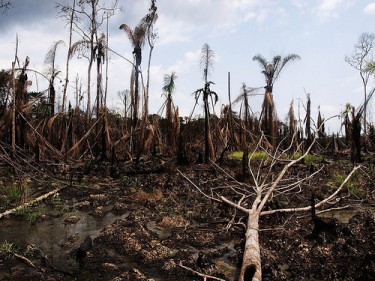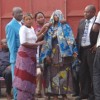Iray amin'ny andian-dahatsoratra nampanaovin'ny Pulitzer Center sy ny Global Voices Online ity lahatsoratra vakianao etoana ity hiresahana amin'ny alalan'ny haino aman-jery isan-karazany (multimedia) ny famakafakana ataon'ny Pulitzer Gateway to Food Insecurity (Vavahadin-tserasera momba ny tsy fahampian-tsakafo)sy ny adihevitry ny mpamaham-bolongana maneratany momba azy ity. Zarao ato ihany koa ny tantaranao momba ny tsy fahampian-tsakafo.
Raha mbola mihanaka ao amin'ny helodranon'i Meksika sy miseho ho lohateny lehibe amin'ny gazety hatrany ny soliky ny BP Amerikana (Etazonia), dia nisy loza nanintona kely ny fampahalalam-baovao manerantany ihany koa any amin'ny firenena iray hafa—Nizeria.
Firenena Afrikana be mponina indrindra ary iray ao anatin'ny 10 mpanondrana solika be indrindra manerantany i Nizeria ary izy ihany koa no mpitrandraka voalohany ity solika ity eto Afrika. Lasa loharanon-karena goavana ho azy ny solika hatramin'ny nahitana azy tamin'ny moron-dranomasin'i Nizeria nandritra ny taompolo 1970. Mameno 90 isanjaton'ny fanondranan'entan'i Nizeria sy mahasahana ny mihoatra ny 80 isanjaton'ny fidiram-bolan'ny governemanta nizeriana io solika io.

Voina nateraky ny fianahan'ny solika eo amin'ny vinanin'i Niger, Saripikan'ny Ligin'ny tanora sosialista ao Norvezy ao amin'ny Flickr (CC-BY-ND)
Saingy tsy niaraka tamin'izany loharanon-karena avy amin'ny solika izany ny firoboroboan'ny toekarena na ny fahatomombanana ara-tsakafo ho an'ny ankabeazan'ny mponina ao an-toerana. Vao tsy ela akory izay tamin'ity taona ity dia niomana amin'ny mety tsy hisian'ny sakafo ny any amin'ny faritra avaratr'i Nizeria, noho ny tsy fisian-drano namely dia namely tokoa, ka nampihena vetivety ny isan'ny biby fiompy sy nampiakatra avo dia avo ny vidin'ny voamaina. Ao amin'ny bolongany ilay Nizeriana Joachim Ibeziako Ezeji, manampahaizana manokana momba ny fampandrosoana maharitra, no mamehy ny fiantraikan'ny itony karazana tsy fahampiana itony.
“Nigeria, a former agrarian nation, abandoned agriculture in the early 1980s when the government refocused the economy on oil exploration… Sadly, the bulk of this revenue is stolen by politicians and their cronies. The consequence is that today, according to the agriculture ministry, 91 million Nigerians representing 65 percent of the country's population are food insecure.”
Natanjaka dia natanjaka ny fambolena nizeriana nialoha ny nampalaza ny solika, saingy nandritra ny taona maro izay dia noadinoina tanteraka ny toeram-pambolena goavana maro. Nosoratan'ilay mpanao gazety David Hecht izay manokana andian-dahatsoratra momba ny krizy ara-tsakafo ao Nizeria tohanan'ny Pulitzer Center on Crisis Reporting (Ivotoerana Pulitzer fitaterana momba ny krizy) fa ny 90 isanjaton'ny vokatry ny fambolena nizeriana ankehitriny dia avy amin'ny toeram-pambolena sy fiompiana kely tsy dia manao ahoana. Tsy mahazo na mahazo fa bitika ihany amin'ny teknolojia maoderina tahaka ny zezika sy ny fitarihan-drano ny ankamaroan'ny tantsaha. Avy amin'izany no mahatonga an'i Nizeria ho iray amin'ny firenena mpanafatra sakafo be indrindra manerantany, indrindra fa ny vary sy ny varimbazaha. Na dia eo aza ireo entana nohafarana ireo, mihoatra ny ampahaefatry ny zaza Nizeriana latsaky ny 5 taona no tratran'ny tsy fahampiantsakafo.
Lasa fototry ny fifandirana, kolikoly ary ny fanitsakitsahana ny zon'olombelona isan-karazany ny orinasam-pitrandrahana solika, indrindra fa ny eo amin'ny vinanin'i Niger. Nanadihady ny fiantraikan'izany toe-javatra izany ny tatitry ny Amnesty International nivoaka tamin'ny herintaona, sy ny fanimbana ny tontolo iainana avy amin'ireo orinasa ireo.
Nahasarika ny maro hijery ny fahapotehana ateraky ny fianahan'ny solika eo amin'ny tontolo iainana, tafiditra amin'izany ihany koa ny fianahan'ny solika misy any amin'ny Vinanin'i Niger, ny fipoahana nahazo ny Deepwater Horizonvao tsy ela akory izay. maromaro manko ny fampitam-baovao no mitatitra fa betsaka kokoa ny mianaka ao amin'ny Vinan'i Niger isan-taona noho izay very tao amin'ny helodranon'i Meksika. Mahatonga fandotoana ny izay mamely mafy ny mponina manodidina izany amin'ny alalan'ny fihenan'ny tahirin-trondro sy ny fahalotoan'ny rano fisotro mbamin'ny fihenan'ny tany azo ambolena.
Mitantara ny fihetsiketseham-panoherana tamin'ny herintaona noho ny tsy fandraisan'i Shell miaraka amin'ny fitondrana Nizeriana andraikitra ny bolongana Niger Delta Unrest. Mitantara ny alahelony ny mponina tra-boina avy ao Bodo:
“They detailed how there was widespread hunger and thirst in the community: all the fish had been killed, the water contaminated, access to the creeks blocked and the ground-soil polluted and crops poisoned. One woman presented a meager basket of cassava meant to feed her family for a week. It was only enough for one person. Another woman pushed forward and said her eight year old son had died of hunger… A higher up in the Youth Council, the same one who had been interpreting, told of his frustrations and how he felt control slipping out of his hands. He said it was getting impossible to calm the youth in the town and that he was sure some of them would slip into militancy and armed action. ‘A hungry man is an angry man,’ he said.”
Randal Maurice Jelks, mamaham-bolongana ao amin'ny The Black Bottom Blog avy any Etazonia, no niteny fa tokony hieritreritra ny maro satria misy itovitovizany ny manjò ny mponina ao Nizeria sy ny tany amoron-dranomasin'ny helodranon'i Louisiana:
“For years, the state of Louisiana has permitted oil companies to have the loosest of regulation–a wink and a nod instead of enforced laws. As result many African Americans, like the Ogoni people of Nigeria, who live in the Gulf region have been most affected by what is called Cancer Alley. The pollutants from chemical and oil production have poisoned both their lands and bodies for years, like the Ogoni people these Black and poor people were ignored. The Louisiana state government like the Nigerian government left the oil companies to their own devices–laissez faire.”
Ao amin'ny lahatsoratra fanadihadiana navoakan'ny gazety nizeriana Vanguard nosoratan'i Peter Osadalor no nahitana fa namorona ny voambolana hoe “Fifanoheran-javatra Nizeriana” ny Banky Mondialy indrindra raha mahita ny fahatrarana aoriana sy ny fahantrana lalina mianjady amin'ny firenena manoloana ny harena voajanahary mitobaka ao amin'ny firenena. Nanolotra vahaolana maro dia maro ny mpamaham-bolongana, manomboka amin'ny fametrahana lalàna henjana kokoa momba ny orinasan-tsolika mandalo ny fanatsarana ny fampiofanana ny mpitarika ka hatramin'ny fampihenana ny fiankinan-doha amin'ny fanafarana entana.
Milaza kosa i Hecht, ao amin'ny lahatsorany fa na dia miatrika ny mety ho krizy ara-tsakafo goavana aza i Nizeria, dia manana tany lonaka ampy hamelomany tena ny firenena sy ny ankamaroan'ny faritra raha tsara zara ny vola azy avy amin'ny solika. Tahaka izany ihany koa tsy tsoa-kevitr'i Afolabi Taiwo Okunola, tao amin'ny lahatsoratra iray nampifaninanana ao amin'ny bolongan'ny Youngstars Foundation, milaza fa ny fiverenana indray amin'ny fambolena no fanalahidiny:
“If the Nigerian government can be dedicated and devoted to the course of agricultural, many problems like inadequate supply of food, high expenses of the food supply will become outdated. The level of unemployment among Nigerian graduates will reduce because many graduates will be gainfully employed. In this vein, agricultural produce will increase because mechanized farming will be used and Nigerian exporting earnings will increase…The quest for power, gross looting of the national treasury by the greedy politicians will reduce to a certain extent because many people will realize that it is not only oil that can give a nation money but that agriculture too is important in that aspect. Therefore, the wicked struggle, killing and wanton destruction of lives and property in order to get to the position of authority in Nigeria will reduce. In a very short time, Nigeria will become a citadel in which other countries will have to come and learn from.”






